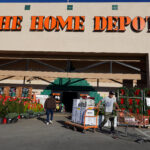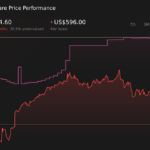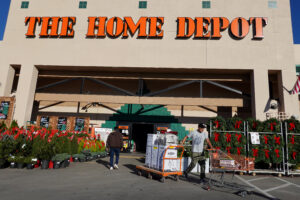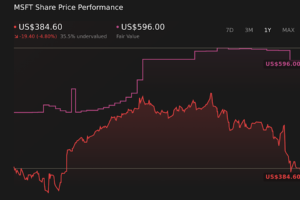
(Bloomberg) —
Nigerian authorities declared a 24-hour lockdown in Lagos, Africa’s most-populous city, amid growing protests against police brutality that have dealt another blow to the coronavirus-battered economy.
Demonstrations that erupted on Oct. 5 have continued despite the government bowing to demands to dissolve a police unit that’s borne the brunt of the brutality allegations. Thousands of people, most of them youths, have taken to the streets of Abuja, the capital, the economic hub of Lagos and other towns, sealing off major roads and bridges, disrupting flights and bringing many businesses to a standstill.
The governor of Lagos state imposed a curfew on Tuesday to try and quell disruptions in a region that’s home to more than 22 million people and houses the headquarters of Nigeria’s biggest banks and other companies. The southern Edo state made a similar declaration on Monday, after hundreds of inmates took advantage of a chaotic demonstration to stage a prison break.
The Lagos lockdown was imposed after two police stations were torched and a major expressway linking the main port city to the northern and southeastern parts of the country was sealed off. In Abuja, soldiers dispersed protesters who had gathered in various parts of the city.
Police Inspector-General Mohammed Adamu ordered the deployment of anti-riot police to protect lives and property.
Economic Cost
The demonstrations have cost an estimated 700 billion naira ($1.8 billion) in lost output so far, according to the Lagos Chamber of Commerce and Industry. It called for grievances to be addressed through dialog, and for an end to the series of marches and street blockades that have spread to about half the nation’s 36 states.
“Over the past 12 days, economic activities have been crippled in most parts of the country,” the chamber said in a statement. “There is a great risk that the situation may degenerate into a case of the complete breakdown of law and order.”
Nigeria’s oil industry — Africa’s biggest and the mainstay of the economy — has been unaffected and yields on the nation’s dollar bonds have ticked up since they began, indicating that investors aren’t unduly concerned.
The fallout will worsen if the unrest drags on and violence that has erupted in recent days intensifies, according to Mosope Arubayi, chief economist at Vetiva Capital in Lagos.
“Locals could be scared to go to work and foreigners will fear for the security of their investment,” he said. “This will have a dire impact on the level of economic activity in the country and existing foreign investors could start exiting their position in the capital market.”
The unrest has weighed on insurance companies, whose shares accounted for three of the five biggest declines on Nigerian Stock Exchange on Tuesday. An industry index fell 1.2%, the most in a week.
Vulnerable Stocks
“Insurance stocks are the most vulnerable” if there’s more violence and property is damaged, said Tajudeen Ibrahim, an analyst at Chapel Hill Denham Securities in Lagos. “We will expect an upward pricing of insurance products if, due to the protests, insurance claims rise significantly in the coming quarters.”
While the government has issued a directive to its security forces not to use violence, Amnesty International accuses the police of still using excessive force. Three people were killed during clashes that erupted during a march in Abuja on Monday, bringing the total killed so far to 18, the human-rights group said on Twitter.
Most previous uprisings in Nigeria have been quashed by the security forces, but the scale of the current protests and the fact that they have been organized on social media and have no clear leaders have made them difficult to quell.
“Communication between the two sides will likely continue to be strained, given a lack of trust in the government,” Songhai Advisory, a Lagos-based risk advisory firm, said in a note to clients. It warned that policing reforms will face legal and fiscal constraints, with the nation’s federal system limiting the ability of the states to effect changes on a force that falls under the ambit of the national government.
Besides policing reforms, the protesters also want President Muhammadu Buhari to deliver a special state-of-the-nation speech, and for the government to pay compensation to those who have died and improve welfare benefits for police officers.
The protesters have won backing from parliament. The Senate on Tuesday urged the government to meet all their demands and the Speaker of the House of Representatives warned that the current budget won’t be passed unless provision is made for victims of police brutality.
“The Nigerian government is not used to something like this,” said Japheth Omojuwa, a political activist from Abuja. “It’s difficult to say it can go this way or that way, but ultimately, the government will always have a say in how far it goes.”
For more articles like this, please visit us at bloomberg.com
Subscribe now to stay ahead with the most trusted business news source.
©2020 Bloomberg L.P.








